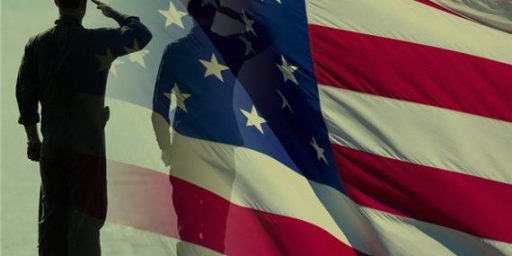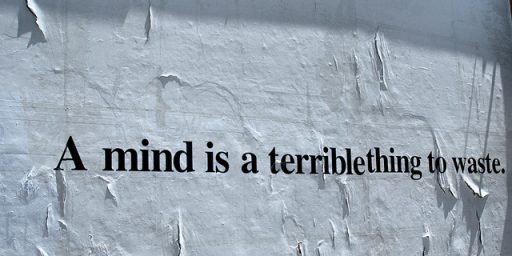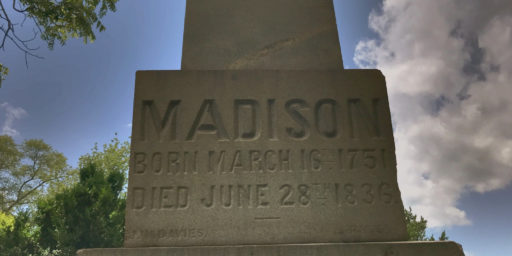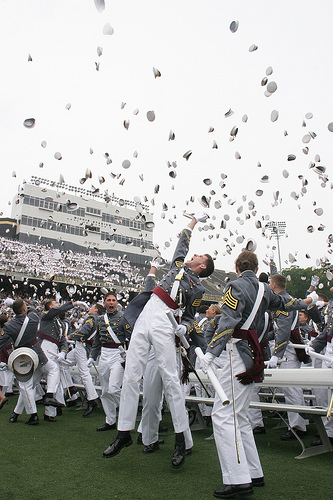Media Aren’t the Enemy in Iraq
Neocon extraordinaire Max Boot hammers hard the notion that defeatist reporting from a hostile media is to blame for our problems in Iraq:
Whatever the shortcomings of some reporting, there has been a lot of first-rate coverage by a heroic corps of correspondents that has persevered in the face of terrible danger. (At least 109 journalists have been killed and many others wounded or kidnapped, making this the deadliest conflict on record for the Fourth Estate.) I am thinking of reporters such as John Burns, Dexter Filkins and Michael Gordon of the New York Times; Greg Jaffe and Michael Philips of the Wall Street Journal; Tom Ricks of the Washington Post; Tony Perry of the Los Angeles Times and former Times reporter John Daniszewski; Sean Naylor of Army Times; Bing West and Robert Kaplan of the Atlantic Monthly; and George Packer of the New Yorker. They’ve risked their necks to get the truth — and not, as Rumsfeld suggested, by flying over Iraq.
If you wanted to figure out what was happening over the last four years, you would have been infinitely better off paying attention to their writing than to what the president or his top generals were saying. If we fail to achieve our goals in Iraq — which the administration defines as a “unified, stable, democratic and secure nation” — it won’t be the fault of the ink-stained wretches or even their blow-dried TV counterparts. To argue otherwise deflects blame from those who deserve it, in the upper echelons of the administration and the armed forces. Perhaps that’s the point.
Phil Carter, who recently returned from a tour of duty in Iraq as an Army Reserve captain, more-or-less agrees.
The typical daily dispatch from Iraq covers the news of the day — whether it’s some intrigue in the Maliki government, a firefight in Baghdad, or a massive attack somewhere else. It is Baghdad-centric, because many of the reporters are based in Baghdad, and also because that’s the main front in the war. To some extent, this daily reporting misses the larger context of Iraq — the fact that many Iraqis go to work, school, the market, etc., and live their daily lives but for the interruptions of spectacular violence. And by and large, the media ignores many of the “good deeds” done at the micro-level by U.S. forces, such as the opening of a new school or the delivery of a new generator, because it rates those events as not newsworthy. And so, if there is a difference between the Iraq I knew and the Iraq in the news, it is the complexity and contradiction presented by these multiple stories going on simultaneously. One gets a lot of press; the other one does not.
However, Boot is absolutely right to say that this criticism only applies at the most superficial level of coverage — what gets aired on Headline News or put out in the daily wire story. If you read the longer, deeper, more nuanced pieces from the journalists he cites, you will see a much richer picture of Iraq emerge. And I would argue that these pieces do a much better job of reporting the truth from Iraq than any official reporting I’ve read. Journalists like George Packer, Anthony Shadid, Tom Ricks, Greg Jaffe, Pam Hess, and their many colleagues, have been to Iraq on many occasions over the last few years, and they’ve really seen the arc of the war. They see long-term trends which short-timers like me (who are only in-country for one 12-month tour) miss; they also notice change from unit to unit, and the relative effectiveness of different units’ strategies. That type of reporting is absolutely critical, and we’ve been fortunate to have such reporters who are willing to risk their necks to get the story.
That’s quite right. While there has been some occasional bad reporting from the wire services, who are able to produce the incredible volume of stories that they do through over-reliance on poorly vetted stringers, the military beat reporters have done an excellent job of covering the war.
That said, Phil’s caveat is an important one. While most policy bloggers and their readers are news junkies and therefore partake in much of the better reporting, the average citizen gets their information either through the evening newscasts or intentionally biased sources (talk radio and the like). That’s not the fault of the major news outlets, of course, let alone their reporters. Still, mass opinion is still feed by the “if it bleeds, it ledes” ethic of the news business.






You haven’t seen a lot of “blame the press” over at my place but I do think there’s a valid criticism to be made. If it’s proper for the legitimate press to ignore, underreport, or gloss over something like, say, the Danish cartoons, that a worldwide Muslim audience might take offense at, why isn’t it equally proper for the press to ignore, underreport, or gloss over something like the incident at Abu Ghraib prison, which that same Muslim audience certainly took offense at?
My own view, by the way, is that the job of the press is to report, not to guard the feelings of a possible audience. Publish and be damned!
How brave any given reporter is, is not relevant. Some terrorists are very brave people as well. Everyone seems to agree if it bleeds it leads. If all the MSM care about is making a buck, that’s would be fine. However they are supposed to have the responsibility of telling the truth to the public. Telling halve a story is not telling the truth.
Much of the news analyses are bias against Bush. Their bias conclusion is what most of the public hear. It gives a false expression and hurts our efforts in Iraq while giving comfort to the terrorist. Terrorist strategy is to get press coverage and influence people opinions that it is a hopeless cause not actual military or substance objectives. Just like Vietnam, the MSM tell falsehoods and turn victories into defeats. There are many ways they can cover this conflict but chooses to do so in a negative manner.
So, if the MSM is helping the terrorist and hurting US efforts then what side are they on?
why isn’t it equally proper for the press to ignore, underreport, or gloss over something like the incident at Abu Ghraib prison, which that same Muslim audience certainly took offense at?
(1) Incident*s*.
(2) Because the American gov’t was not responsible for the cartoons.
(3) Because torturing people is generally recognized to be much more wicked than publishing cartoons satirizing their creed. Some may be confused by this, but there is no reason for the news media to share that confusion.
And that’s the point of this whole thing, and why I have always felt the press is fighting against us. That kind of mentality is exactly why a terrorist action is so effective. That factor, that ‘it bleeds, it leads’ mentality is, I think, of even greater import to the biased picture we’re getting of Iraq from the press, than their (rather obviously troublesome) anti-Bush bias is.
How about a different angle on that…
If the MSM is helping certain politicians remain in power by underreporting or glossing over incompetence, immorality and criminal activity and hurting US national interests, national security, and the general public, what side are they on?
Anderson, you’re making my point for me.
So, either injured feelings on the part of Muslims was a red herring or the value of demonstrating the perfidy of the American government overrides the value of not injuring Muslim feelings.
Wrong as a matter of fact. We may recognize that hierarchy of value but it is not “generally recognized”. That’s a viewpoint with cultural blinders and our media is no longer speaking only to our culture. Indeed, I remember reading Muslim commenters who asserted that the publication of the cartoons was as bad or worse than the situation at Abu Ghraib.
legion
Let’s not bring Clinton into this.
It would be nice if they did a little of that for Bush but they have done just the opposite. The have accuse Bush of breaking the law when he hasn’t. Being incompetent at time when he wasn’t. Saying Bush said something when he did not. All for the purpose of hurting the conservative movement and if it hurt the US so what. Power at all cost.
Forgive me if you’re making a joke, but do you mean “isn’t” instead of “is” in the first sentence?